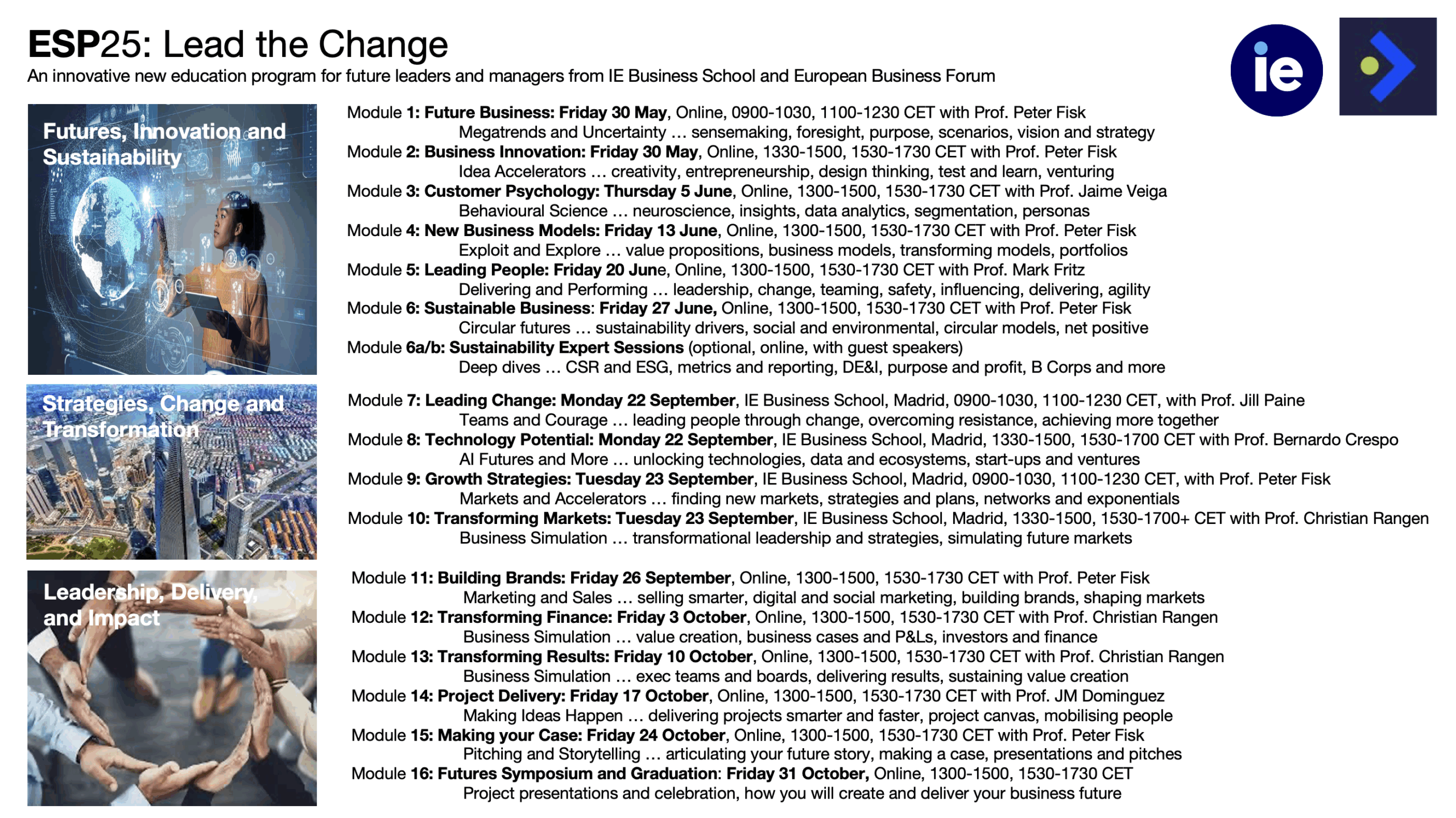Lead the Change: Technology Potential
September 22, 2025 at ESP25 at IE Business School, Madrid

Incredible technologies and geopolitical shifts, complex markets and stagnating growth, demanding customers and disruptive entrepreneurs, environmental crisis and social distrust, unexpected shocks and uncertain futures.
For every business leader, the challenge is about making sense of today’s rapidly changing world, and understanding how to prepare for, and succeed, in tomorrow’s world.
We explore how businesses can survive and thrive, and move forwards to create a better future. How to reimagine business, to reinvent markets, to reengage people. We consider what it means to combine profit with more purpose, intelligent technologies with creative people, radical innovation with sustainable impact.
We learn from the innovative strategies of incredible companies – Alibaba and ASML, Biontech and BlackRock, Canva and Collossal, NotCo and Netflix, Patagonia and PingAn, Spotify and Supercell, and many more. We also take a look at what this means for insurance, and some of the most innovative companies in the field.

Are you ready to seize the opportunities of a changing world?
How will you – and your strategy, organisation, people and projects – embrace the challenges and opportunities of change ahead of us? Where are your biggest opportunities for innovation and growth? What are your priorities to balance short and longer term? How will you behave as a manager and leader?
We’ve developed a new program for business leaders, managers of companies large and small, to get up to speed with the very latest ideas, tools and approaches to business, learning from companies and experts around the world. It’s called the Executive Management Program, delivered as a hybrid program online and in face to face in Madrid.
It’s like a Mini MBA, but fit for today’s world, where challenges like economic uncertainty and climate change are matched by opportunities like the applications of AI and new business models. It includes an exciting dynamic business simulation, about managing and leading change, plus insights and ideas from the world’s most interesting companies, right now.
In fact it brings together much of the Global Online MBA from IE Business School, which is ranked #1 in the world, and in particularly for topics such as ESG and sustainability. The faculty is made up of expert professors from IE and beyond, and we spend a number of days in Madrid at IE’s Executive Education campus.
For more info, contact me directly: peterfisk@peterfisk.com

Module 8: Technology Potential, Reinventing Business in the Age of Intelligent Systems
We are entering an era where the convergence of advanced technologies is poised to fundamentally reshape how businesses operate, create value, and compete. No longer confined to efficiency gains or process improvements, today’s technologies—led by artificial intelligence (AI) but spanning everything from blockchain and robotics to genomics and quantum computing—are enabling the reinvention of business models, industries, and value chains.
The magnitude of this shift is profound. It’s not just a technological transformation; it’s a strategic one. Businesses that embrace these capabilities can leap beyond incremental innovation to reimagine customer value, unlock entirely new markets, and redefine their role in the economy. Those that don’t may find themselves obsolete in a world that moves faster than they can adapt.
Artificial Intelligence: The Engine of Intelligent Reinvention
Among all emerging technologies, AI stands at the center of the modern transformation agenda. It is not just a tool—it is becoming a core infrastructure for decision-making, operations, and growth. AI can analyze massive data sets in real time, learn from patterns, and automate complex tasks, from fraud detection and logistics optimization to creative tasks like writing, designing, and coding.
Companies like Microsoft and Nvidia are at the forefront, embedding AI in everything from cloud services to industrial design. Meanwhile, traditional companies are rethinking their operating models through AI-powered insights. For instance, Unilever uses AI to anticipate consumer trends, optimize product formulations, and reduce waste in supply chains. Ping An, a Chinese financial giant, uses AI to underwrite insurance, manage investments, and provide health diagnoses—automating complex services that once required human judgment.
AI also fuels personalization at scale. Retailers like Amazon and Shopify use AI to create highly individualized experiences, predicting what a customer wants before they know it themselves. This is not just about recommendation engines—it’s about creating adaptive, self-improving businesses that learn and evolve faster than their competitors.
Digital Platforms: The New Operating System of Business
Digital platforms—cloud-based, data-driven ecosystems—are revolutionizing how businesses scale, collaborate, and monetize value. These platforms enable modular business architectures, where capabilities (e.g., payments, logistics, identity verification) can be plugged in as needed.
Companies like Shopify, GitLab, and Salesforce provide foundational platforms that empower millions of businesses to grow without owning physical infrastructure. Meanwhile, platforms like Alibaba, Airbnb, and Uber have shown how software can unlock underutilized assets (like rooms and cars) and scale marketplaces globally with unprecedented speed.
These platforms are not just enabling businesses—they are redefining what it means to be a business. A retailer can become a media company. A logistics provider can become a data platform. The boundaries are blurring, and platforms are becoming central nervous systems of business ecosystems.
Blockchain and Decentralization: Trust Without Intermediaries
Blockchain technology has unlocked the possibility of decentralized, transparent, and tamper-proof systems. While still maturing, its potential to transform industries is enormous—especially those reliant on intermediaries, from finance to real estate to supply chains.
In financial services, blockchain is enabling faster, cheaper cross-border payments, tokenized assets, and decentralized finance (DeFi). Companies like Circle and Chainalysis are building core infrastructure for a programmable financial future. In supply chains, blockchain enhances transparency and traceability—Walmart, for example, uses blockchain to track food safety across its global sourcing network.
Beyond finance, blockchain has potential to reinvent identity management, intellectual property, and even voting systems. It challenges the centralized models that have dominated the 20th century and opens the door to more democratic, transparent digital infrastructure.
Robotics and Automation: The Physical Transformation of Work
Advanced robotics, combined with AI and machine vision, are transforming industries like manufacturing, logistics, agriculture, and healthcare. Robots today are more dexterous, intelligent, and collaborative than ever—working alongside humans, rather than replacing them.
Amazon’s warehouses are powered by fleets of robots that move goods, scan items, and optimize picking routes. In factories, companies like ABB and Fanuc provide precision robotics that can adapt to different tasks. In agriculture, autonomous drones and robotic harvesters increase yield and reduce labor intensity.
This is not just about efficiency. Robotics enables new business models. For example, Zipline uses autonomous drones to deliver medical supplies to remote regions in Africa. In healthcare, robotic surgery and assistive robots are redefining care delivery, particularly in aging societies.
Genomics and the Bioeconomy: Rewriting the Code of Life
The genomics revolution—propelled by AI, cheap DNA sequencing, and synthetic biology—is opening entirely new frontiers in health, agriculture, and beyond. Companies like Illumina and Ginkgo Bioworks are decoding the biology of life and engineering it for new uses.
Precision medicine—tailoring treatments to an individual’s genetic profile—is transforming healthcare. Gene editing tools like CRISPR allow us to not only detect but also fix genetic defects. In agriculture, genetically engineered crops can resist drought, reduce pesticide use, and boost nutrition.
The implications are vast. Biotech can replace petrochemical-based products with bio-based ones, create lab-grown meat, or manufacture materials with programmed functions. The future of business may increasingly be written in biological code, not digital.
Energy Storage and Climate Tech: A New Industrial Revolution
The twin pressures of climate change and energy transition are accelerating innovation in clean tech and energy systems. At the center of this transformation is energy storage, which enables the use of intermittent renewables like wind and solar at scale.
Tesla and CATL are leading the battery revolution, while startups like Form Energy are developing long-duration storage technologies. Better batteries mean electrified transportation, decarbonized grids, and more resilient infrastructure.
This is catalyzing a shift to a circular, regenerative economy, where waste becomes input and sustainability is embedded in design. Companies like Schneider Electric are leading by example, offering digital platforms that optimize energy use in buildings, factories, and cities—turning sustainability into a competitive advantage.
Quantum Computing: Leaps in Possibility
Though still in its early stages, quantum computing promises to solve problems that classical computers cannot—transforming industries like pharmaceuticals, finance, and logistics.
Companies like IBM, Google, and D-Wave are making rapid progress. Quantum could enable the simulation of complex molecules to discover new drugs, optimization of global supply chains with millions of variables, or even breakthroughs in material science.
When it matures, quantum computing won’t just be an upgrade—it will be a paradigm shift, enabling solutions previously thought impossible.
Tech-Powered Business Reinvention
The technologies now reshaping the business world are not additive—they are multiplicative. Their power compounds when combined: AI + robotics = autonomous systems; blockchain + IoT = trusted supply chains; genomics + AI = precision health.
Leading companies are not waiting for maturity. They are experimenting boldly, scaling fast, and reimagining their roles in value creation. They’re turning technology from an IT concern into a strategic capability—embedding it in culture, governance, and customer experience.
To unlock technology’s full potential, leaders must do more than adopt tools. They must shift their mindset: from efficiency to exploration, from linear planning to adaptive learning, from ownership to orchestration.
We are only at the beginning of this transformation. The next decade will not just change how business is done—it will change what business is. The companies that harness this technology potential will not only survive—they will shape the future.
Find out more and book >